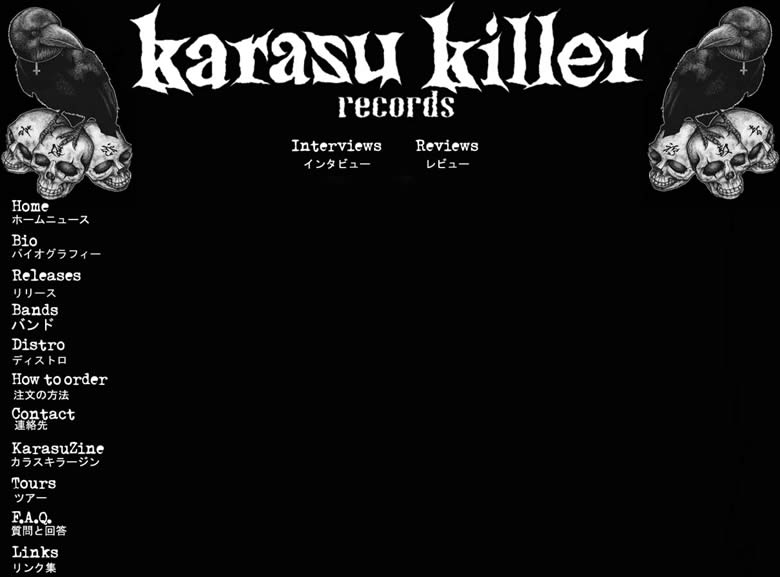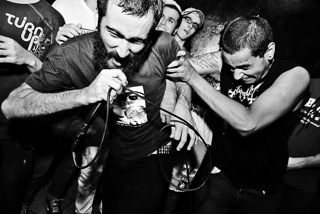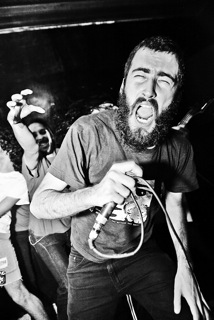
Interview: Alarme
by Rafael Karasu (rafael@karasukiller.com)
Photo: Mateus Mondini
originally published in EL ZINE (Japan) Cross the border Vol.0
2009/11
Alarme

1-Alarme, how are you guys?
We’re doing good. Playing, working, studying... Trying to make our stuff work here.
2- Give us a precise, quick definition of Alarme’s sound, so Japanese readers can understand what you guys are up to.
Extreme hardcore... We want to play hardcore as it used to be: fast, energetic, full of anger and passion.
3- Who is Alarme! nowadays? Tell us about the band's history, how and when did you get started? What drove you to start a band?
Angu on vocals, Pato plays the guitar, Bruno the bass and Leo is the drummer. We've been friends for a long time (Bruno is Pato’s brother). So we started booking shows of some bands in our city and having contact with people from other places, like São Paulo, Rio de Janeiro... Then we started playing in bands, until we finally joined to play in Alarme. We started it in early 2005, motivated by the bands that we used to listen to, as well as the necessity of expressing ourselves and being heard... Also to escape from our ordinary lives.
4- What are the band's major influences?
When we started, we wanted to do something like old English hardcore, from the 80’s: Heresy, Ripcord... with some American crossover influence too, like D.R.I. and Accused. Also like bands from the present, like WHN, and I Shot Cyrus from Brazil, Ratos de Porão... As time went by we started to be influenced by the ideas of bands from all around the world, including the Japanese ones (which became a strong influence in our full-length).
5- Tell us about Alarme releases.
We have a 7inch released in the US called ‘Walk Together, Thrash Together’, by Give Praise Records and a full-length CD, ‘Starving Wolves & Death Machine Inc.’, released last year in Brazil, Peru and Japan by Karasu Killer. It will soon be released in LP in Europe. And we participated in a compilation too, called ‘Planet of Friends’. It’s kind of a benefit record to get money to a guy that got in trouble with some stupid Nazis in Russia, and needed some surgeries to stay alive. You can check this story on myspace.
 6- What's the meaning of punk/hardcore in your lives? Do you consider yourselves a punk/hardcore band both musically and in your posture?
6- What's the meaning of punk/hardcore in your lives? Do you consider yourselves a punk/hardcore band both musically and in your posture?
Pato – Definitely this is something that completely changed our lives, way better. We're from a countryside industrial city, and we wouldn't have any other option than living the same life our parents and grandparents did. Then we had this contact/exposure to other places, other kind of stuff. And this showed us that life is not only this stupidity about getting born, work and die. It's kind of a pride, to know that we can do much more than that. And this hardcore thing reflects in our lives on the same way, making us to push things to the limit, to the extremes. And facing things with the maximum energy and feeling that we can. At least this is what happens for me...
A - About the posture as a band, for me it's about being a DIY band and everything we do is based on it. We know people that are ready to help us in lots of ways. These people make it all possible: release records, travel to different places. This is so obvious for us, but everytime I stop to think about it, I realize that it's just possible because of this network of friends that we've created. One of the things that really matter for us is that we can support each other without caring about profits or any other kind of status that reflects society's rules, like the one in which we always have to take advantage on everything we do.
7- Does everyone in the band have a job? How do you manage working and playing?
PATO- We all work, my brother is the only one who studies only, in college. And I just quit my job, to have time for college – but by the time you read this interview I’ll be probably working again. Angu is an Arts teacher.
It's kind of easy to have a job and a band here, most shows happen on the weekends. The problem is to tour. But we just don't give up shows because of our jobs hehehe. When we play in other cities we travel all night long to arrive home early and then go to work.
8-Your songs are sung in Portuguese. Can you explain the content of Bandanos' lyrics? How's the writing process?
ANGU – Lyrics are about all the stuff that I’ve said before, about this DIY way to face things, to fight for and reflect about what we can do in our lives. About taking action about things and all possibilities we have in our hands, even if we don’t know exactly what to do with them. Kind of “where there’s a will, there’s a way”.
PATO – Well, and when we are composing, basically we already have the songs' ideas in mind, most of time with all the riffs, I like to do them at home. Then we just have to play it together... Sometimes we spend some months without practicing, because someone is traveling or is not in town for a while, but then when we get together we just try to make everything work fast, and it turns out kind of easy to do all the stuff.
9- What do you consider the most important shows?
It’s difficult to say. We played in a Verdurada edition (one of the biggest DIY festivals in Brazil) to about 1200 people, with Vitamin-X and Mukeka Di Rato, and it was awesome, not only the show, but also because we met a lot of friends from the whole country. There was this show in Angra Dos Reis, to a huge rocker crowd, and they destroyed the whole place! in general, shows in distant places are better, we can meet people, new places. Recently we've played 3 shows on the south of Brazil and they were awesome too.
10- What do you think are the positive and the negative aspects in the current phase of Brazilian underground? Is there support?
P - I think we're having such a great time here. Music is very accessible with internet, and lots of people are starting good bands. Things here got really better, bigger. In late 90s bands like No Violence, Discarga, ISC, Infect, and so many others, got the attention for the Brazilian scene again, and kind of changed the punk and hardcore history here. Of course there were lots of other people that weren't in bands, but were involved in some way, and labels too, like Läjä and Peculio, that helped to spread the message. Well, credits shouldn't go for these people only, but definitely they were the center of it all. Also it helps the fact that Brazil has always had a scene, with good bands and people doing stuff, trying to make it work.
A - The negative side is more about the difficulty to do some things, because of the huge distances and high costs. It's difficult to do a tour and release records (vinyls), because it's hard to get the money back, they're not self sustainable... It seems that in other countries (like US and Europe) people can do these things much easier, without too much sacrifice, and this is how things should work for everybody.
11- Since 2003 there's a new wave of punk/hardcore bands coming around in Brazil. How do you see this revitalization? Which bands/artists do you consider prominent??
A – There’s a lot of good new bands. Most of them are friends of ours... I would say: Velho de Câncer, Renegades of Punk, Regime Tentáculo, Catarro, Possuído Pelo Cão, Low Life, Nerds Attack!, Vivenciar, Sweet Suburbia... These are the ones I can remember right now...
P – We’re from this new generation of bands too...
12- Tell us about the positive and negative aspects of living in Rio de Janeiro.
A – Actually, we’re from the countryside of the state of Rio de Janeiro, it's 2 hours far from Rio de Janeiro city, so the reality is quite different. Recently I moved to Rio de Janeiro city and I could feel it stronger. It’s kind of a very chaotic city with lots of social differences. But at the same time there are lots of beautiful places, like beaches, forests, and people are very receptive. In the countryside there isn't so much chaos and misery, but the access to cultural stuff like universities and so on is smaller. In Rio, it's really difficult to find a job, to have access to hospitals, schools... In other parts of Brazil this is not so different (there are some exceptions like in the south of the country), but in Rio those differences are more visible.
 13- More and more we hear about corruption, violence and unemployment in Brazil, what do you see in the country's future?
13- More and more we hear about corruption, violence and unemployment in Brazil, what do you see in the country's future?
P - I think this is kind of the critical question of this interview. I will tell you the point of view of someone who walks on the streets, catching buses, crowded trains - well, most of time I ride my bicycle, but sometimes it's not possible in São Paulo. But here's the thing: sometimes you just feel like getting out of here, leave it all behind and try to get a better life somewhere else. People is oppressed, but most of them don't care about it, sometimes they don't even have the energy to think about any other stuff than supporting their family. These people get starving, tired on a 9:00pm train back home, commuting even 2 hours long, and if you try to say something like 'fuck, you deserve a better life, there's got to be a better way for us all', you'll probably listen something like 'you're saying that because you’ve studied, you're wealthy... I'd like to listen you say that if you had a lot of mouths to feed at home'. In our country's history there hasn't been such thing as someone with a critical and revolutionary mind. There hasn't been a real left movement that reached people, the poor people. The middle class claims to be the democracy in today's country because they were the ones who've been on the streets 20 years ago to fight against the dictatorship. But fuck them, because they (middle and high class) dictate the rules now. And the middle/high classes here are very conservative, they're only interested in affording cars to their children, having a career, and not to get along with the rest of the population.
So, the country is going down and nobody gives a fuck about the corruption, because if there's money at home that's ok. People think that caring about their family is enough, that this is what they should do, and all the poverty and exploitation around are not their problem.
Of course there's corruption in the whole world, in all stages of human history. But most of time something is done about it. In Peru I guess, they've killed a mayor when his corruption cases came to the TV news. I'm not saying you need to kill them, but just saying that people should do something...
In the last 5 years there has been a lot of corruption cases in Brazil involving the whole government but nothing happened.
Reading about the ancient societies, about history, you can understand it better. I believe Europe and the powerful countries in the world are in this position because they've planned to be like this. They've planned to be commercial centers, owners of 'capital' and at the same time good places to live. Rome has implanted all this geographic system distribution, organized streets, and the administration system, the government the way it is today. So these places like Europe and the US, that was a settler colony instead of a plantation like Brazil, have developed. Through our country's history nothing was planned. Cities just were inhabited and built as long as there were something to be extracted. And since the country got independent, there has never been a consistent political or geographic system. So there are a lot of ‘favelas’ (shanty towns), disorganized street models, like most part of 3rd world countries. And all this things plus the politicians and authorities' greed have contributed to the bad situation that the country is today.
About the future, I really don't know. Today there are a lot of independent groups, a lot of people that earned experience based in left movements in other countries, that are doing good things. Like 'critical mass' movements and others that care about the 'humanized' side of cities, and all these ecological issues of today, can help things to get better. So maybe this conservative elite that dictate the rules around here get changed, but there aren't many signs this is gonna happen. Even in the new generation there are many conservative people, despite everybody believe they can change the country.
14- Reality here is completely different from Brazil, what do you know about Japan? What do you admire about this country?
P - Since I was a kid I like Japanese stuff. It began with the Tokusatsus that used to be broadcasted on TV here. Then, mafia and samurai movies. So I started reading and I think I've learned something, but more about the past. I like the way that things are faced on Japanese stories (old ones), like heroes that have self conflicts that sometimes can't be separated from evil, making honesty the only way to survive. This thing about 'good guys' don't be so different from the 'bad guys', being all part of the underground. It's a thing that I kind of identify myself.
A - I don't know too much about Japan, but the few things that I know seems very interesting to me. I know a little bit about Japanese arts and how the 'Zen-Buddhist' thought has influenced the Occidental arts/culture. Also the way they express themselves, and how it reflects on bands, movies and arts. Well, things that arrive here are probably quite different than what they really are, but all this Japanese aesthetics of movies, music and tattoos are very interesting, it makes me want to know more about Japanese culture.
15- Which Japanese bands do you know? What impresses you the most about Japanese bands?
A - I’m a huge fan of Japanese bands! I like a lot Death Side, Rose Rose, Gauze, Lip Cream, Paint Box, Lie, Jellyroll Rockheads, Flash Gordon, Crucial Section, Mind of Asian… In general Japanese bands are very noisy, aggressive and powerful and I like it a lot. It’s awesome how you guys can do it so well. You are the masters in this area! “Wasted Dream” is one of the best hardcore records ever for me.
P – Yeah, we’re Japanese Hardcore lovers! It’s kind of our biggest influence. For sure the best is the anger, the rage, how it’s sang and the level that you guys brought the hardcore. The first time that I’ve listened to Death Side it was kind of ‘fuck, this is Broken Bones to the extreme’, with that insane vocal… It was like the demoniac version of those Tokusatsus themes hehe.
16- What are the next plans of the band?
We’re practicing, doing new songs that we intend to record, probably to do a split record. And we’re planning some tours too, maybe outside of the country, but we're not sure yet...
17- Leave a message from Alarme to the Japanese readers.
Thanks a lot for the opportunity. We got really happy when our CD was released tin Japan, and way more when you asked us to answer this interview. One of our dreams is to play over there, maybe it happens someday… And thanks to Rafael to, Karasu Killer Records, for releasing us over there.
So that’s it, and “Laugh ‘till you die”!
Contact:
angusxe@gmail.com
www.myspace.com/alarme